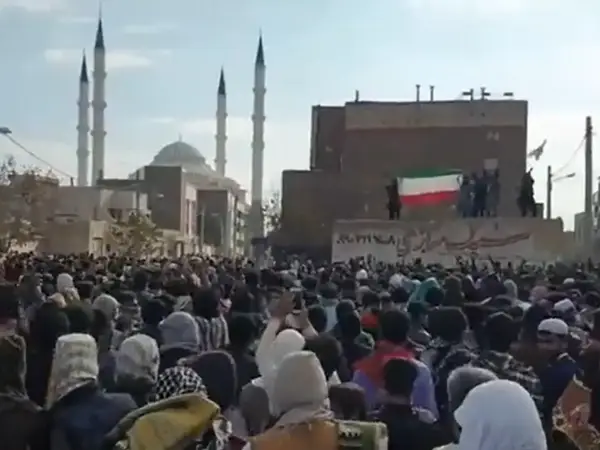Iran’s security forces opened fire injuring at least 23 people in Zahedan, including four children, who were marking the one-year anniversary of a government massacre.
Amid heavy security presence, the predominantly Sunni population of the city held another demonstration after their Friday prayers, as they had done every single Friday during the past year. This Friday marked the eve of the regime's brutal crackdown on protesters in several cities of Sistan-Baluchestan province on September 30, 2022.
Online videos from the Friday rallies show security forces using live fire and tear gas to disperse the protesters, injuring several people. Several other cities in the province, such as Khash, Rask, and Taftan, have seen people taking to the streets, chanting slogans against the regime. In some of the videos from Zahedan and Khash, security forces are seen retreating as protesters advance towards them.
By nightfall, people in several cities are still out on streets setting up bonfires to disrupt the movements of security forces.
Footage from the clashes and the injured protesters at hospitals were so touching that Iranians on social media have already started condemning the brutal crackdown.
US Representative Claudia Tenney (R-NY) said on X that she is appalled by the attack on Makki Mosque, calling on the IRGC to immediately end this abhorrent assault on the Iranian people.
September 30, 2022 is known as "Bloody Friday" which witnessed a devastating loss of life, with approximately 100 protesters in the Baluch region of Iran, including women and children, falling victim to direct gunfire from military and security forces.
Many of them succumbed to severe head and chest injuries, marking a dark chapter in Iran's history that unfolded amidst the uprising against the regime following the death of Mahsa Amini and the rape of a 15-year-old Baluch girl by the police chief of Chabahar, a city in Sistan-Baluchestan province. The regime has since failed to take any action against the perpetrators or launch a transparent investigation.
In some of the videos from Zahedan and Khash, security forces are seen retreating as protesters advance towards them. Some people on social media commented that Zahedan is fighting on behalf of all Iranians.
The protests began after Friday prayer sermons by Iran's leading Sunni cleric, Mowlavi Abdolhamid, in Zahedan's Makki mosque, where he decried the regime's inaction regarding the perpetrators of the Bloody Friday incident. The mosque was surrounded by a large number of security forces who had set up tents and positioned armed forces in the area during the night in anticipation of protests.
A huge number of people attended the congregation and embarked on a rally, chanting slogans and carrying banners despite the security atmosphere.
Referring to Bloody Friday, Abdolhamid, who has become a dissident cleric, emphasized that such a massacre is a consequence of the discriminatory policies of the regime towards ethnic and religious minorities. The outspoken cleric, who delivered his speech amid an internet shutdown that disrupted the live broadcast of the sermon, noted that "such an attack with over 100 killed and 300 injured does not happen anywhere else in the world."
As Sunni Muslims, Baluch citizens are both an ethnic and religious minority. Estimates of the Iranian Baluch population range from 1.5 to 2 million people. The Baluch community, along with the Kurds, has always been among the most persecuted minorities in Iran and has the largest number of people executed in the country.
Abdolhamid, who described Bloody Friday as a premeditated action against the Baluch minority last year, noted that the prayer ground in the city of Zahedan, where the attacks took place, had always been a place of "unity and security," and no one expected such a massacre to happen there.
He added that while the "judges" handling the case of the Bloody Friday incident are "good people," they lack the independence they should have, and underlined that he is aware of "the pressure from various authorities" exerted on them.
